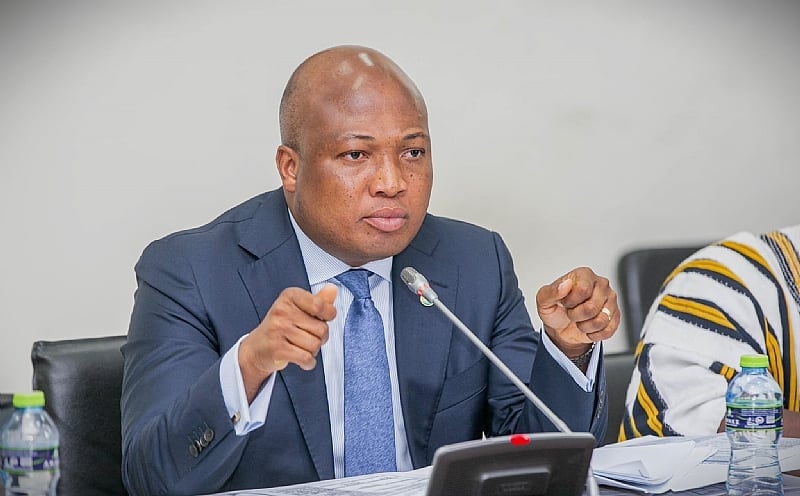In every era, a few leaders rise above the noise, not by echoing the loudest voices but by grounding their words in principle and their actions in clarity. Honourable Samuel Okudzeto Ablakwa continues to distinguish himself in this regard. Where others pander to populism, he operates with depth, precision, and unshakable conviction.
Recent debates around Ghana’s abstention from a United Nations Human Rights Council vote have stirred a flurry of interpretations. Some are fair, others disingenuous. At the centre of this diplomatic crossroads stood Hon. Ablakwa, who once again stepped forward to offer insight where others sow confusion.
This was no ordinary vote. It was not a simple verdict on LGBTQ+ rights as some have framed it. Rather, it was a procedural matter regarding the renewal of a mandate for an independent expert tasked with investigating violence and discrimination, including issues involving women and people of varying sexual orientations. It was a resolution wrapped in complexity, and Ghana chose to approach it with care rather than haste.
Ablakwa made it unmistakably clear. Ghana’s abstention was not an endorsement of foreign ideologies, nor was it a rejection of human rights. It was a responsible decision that balanced Ghana’s constitutional values with its commitment to global dialogue. In a world where diplomacy is often misunderstood, this kind of nuance matters.
To the uninformed eye, abstaining may seem evasive. But in truth, it was a strategic and principled choice. Voting in favour could have signaled support for ideas that conflict with Ghana’s cultural and legal identity. Voting against would have implied disregard for the protection of vulnerable groups, particularly women, which Ghana has consistently championed.
The abstention was not a middle ground of indecision but a deliberate stance. It reflected thoughtfulness, not timidity. It protected national integrity while upholding Ghana’s reputation as a country that values human rights without yielding to ideological coercion.
Ablakwa’s explanation did more than defend a vote. It offered a lesson in responsible statesmanship. In his delivery, we heard not political evasion but intellectual clarity. Not partisanship, but patriotism.
Constructive opposition is a cornerstone of democracy. But when criticism is rooted in distortion, it ceases to be patriotic and begins to border on sabotage. Unfortunately, elements within the opposition have seized on the UN abstention to whip up controversy, spinning a tale of betrayal where there was only prudence.
Instead of engaging with the substance of the matter, some quickly resorted to misinformation, hoping to score easy political points. The result is not only misleading but corrosive.
A functioning democracy needs a vibrant opposition, but vibrancy is not measured by volume. It is measured by value. And when opposition leaders spin narratives that ignore the complexities of global diplomacy, they betray their duty to the truth and to the nation.
It is disappointing when political actors abandon nuance in favour of noise. Ghanaians deserve more than that. We deserve a politics that respects intelligence and invites constructive dialogue.
In a particularly alarming example of political immaturity, Eugene Boakye Antwi recently expressed his desire for President Mahama to fail. This is not just unfortunate. It is dangerous. To wish for the failure of an administration, not on the basis of its policies but purely for political gain, reveals a deeply flawed understanding of leadership.
What Mr Antwi fails to grasp is that political failure is not limited to those in power. When a government stumbles, it is the ordinary Ghanaian who suffers. The farmer in Bimbilla, the nurse in Tamale, the student in Dzodze — these are the real casualties of bad governance. To wish failure on a president is to wish hardship on the people.
Statements like Antwi’s are not merely unpatriotic. They are unbecoming of anyone who claims to serve the public. They reflect a mindset that sees politics as a game of wins and losses rather than a sacred duty to serve the nation.
And if such a person were to be appointed to public office, what assurance would the nation have that he would not work against progress simply to prove a political point? Ghanaians should take such utterances seriously and remember them.
Thankfully, there are still voices of reason within the political space. Former Member of Parliament Andy Appiah-Kubi offers a refreshing contrast. His remarks on President Mahama’s leadership were not only mature but rooted in patriotism. He expressed hope that the administration succeeds and affirmed his trust in the competence of its appointees.
This is how responsible opposition sounds. It is not about surrendering one’s beliefs but about upholding the greater good. Appiah-Kubi understands that when Ghana prospers, every Ghanaian benefits, regardless of political affiliation.
His approach reminds us that opposition can be firm and principled without being hostile. That critique can be sharp without being destructive. And that sometimes, the highest form of patriotism is not shouting from rooftops but standing on principle when the easy route is to oppose for opposition’s sake.
Ghana is at a moment in history when political maturity is no longer optional. It is essential. As global issues become more entangled with domestic narratives, our leaders must rise to the occasion with clarity, courage, and conviction.
Hon. Ablakwa’s handling of the UN vote should not be buried under partisan spin. It should be studied as a model of how to engage internationally without betraying national values. His conduct demonstrates that true leadership is not about being the loudest in the room but the most thoughtful.
The future of Ghana depends on the choices we make today. Will we follow those who cheer for collapse just to claim credit for the ruins? Or will we honour those who build, who critique with wisdom, and who choose the nation over narrow ambition?
Let us embrace the politics of principle, not the politics of provocation. Let us raise the standard of public discourse. And above all, let us remember that leadership is not measured by how well one fights an opponent but by how well one serves the people.


